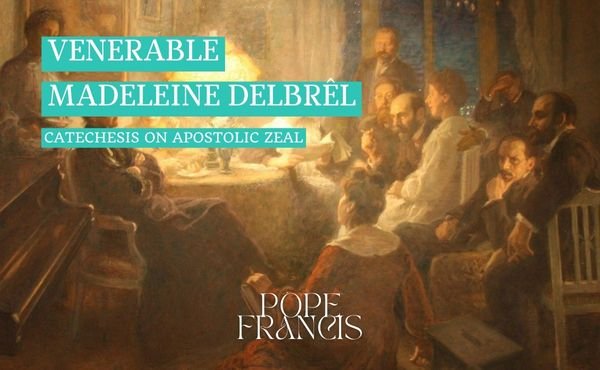Dear brothers and sisters, good morning!
Among the many witnesses of the passion for the proclamation of the Gospel, those impassioned evangelizers, today I will present a twentieth-century French woman, the venerable servant of God Madeleine Delbrêl. She was born in 1904 and died in 1964, a social worker, writer and mystic, and lived for more than thirty years in the poor, working class outskirts of Paris. Dazzled by the encounter with the Lord, she wrote: “Once we have come to know the word of God, we have no right not to receive it; once we have received it, we have no right not to let it be incarnated in us; once it has been incarnated in us, we have no right to keep it for ourselves: from that moment on, we belong to those who await it” (La santità della gente comune, Milan 2020, 71). Beautiful: what she wrote is beautiful.
After an adolescence of agnosticism – she believed in nothing – at the age of around twenty Madeleine encountered the Lord, struck by the witness of some friends who were believers. She set out in search of God, giving voice to a profound thirst that she felt within, and came to learn that the “emptiness that cried out her anguish in her” was God who sought her (Abbagliata da Dio. Corrispondenza, 1910-1941, Milan 2007, 96). The joy of faith led her to evolve towards the choice of a life entirely given to God, in the heart of the Church and in the heart of the world, simply sharing in fraternity the life of the “street people.” Thus, she poetically addressed Jesus: “To be with you on your path, we must go, even when our laziness begs us to stay. You have chosen us to stay in a strange balance, a balance that can be achieved and maintained only in movement, only in momentum. A bit like a bicycle, which does not stay upright unless its wheels turn. … We can stay upright only by going forward, moving, in a surge of charity”. It is what she calls the “spirituality of the bicycle” (Umorismo nell’Amore. Meditazioni e poesie, Milan 2011, 56). Only on the move, on the go, do we live in the balance of faith, which is an imbalance, but it is like that: like the bicycle. If you stop, it does not stay upright.
Madeleine had a constantly outgoing heart, and she let herself be challenged by the cry of the poor. She felt that the Living God of the Gospel should burn within us until we have taken his name to those who have not yet found it. In this spirit, oriented towards the stirrings of the world and the cry of the poor, Madeleine felt called to “live Jesus’ love entirely and to the letter, from the oil of the good Samaritan to the vinegar of Calvary, thus giving him love for love … because, by loving him without reserve and letting ourselves be loved completely, the two great commandments of charity are incarnated in us and become but one” (La vocation de la charité, 1, Œuvres complètes XIII, Bruyères-le-Châtel, 138-139).
Finally, Madeleine teaches us yet another thing: that by evangelizing one is evangelized: by evangelizing we are evangelized. Therefore, she used to say, echoing Saint Paul: “Woe to me if evangelizing, I do not evangelize myself”. Indeed, evangelizing evangelizes one. And this is a beautiful doctrine.
Looking at this witness of the Gospel, we too learn that in every personal or social situation or circumstance of our life, the Lord is present and calls to us to inhabit our own time, to share our life with others, to mingle with the joys and sorrows of the world. In particular, he teaches us that even secularized environments are helpful for conversion, because contact with non-believers prompts the believer to a continual revision of his or her way of believing and rediscovering faith it its essentiality (cf. Noi dell estrade, Milan 1988, 268s).
May Madeleine Delbrêl teach us to live this faith “on the move,” so to speak, this fruitful faith that makes every act of faith an act of charity in the proclamation of the Gospel. Thank you.
